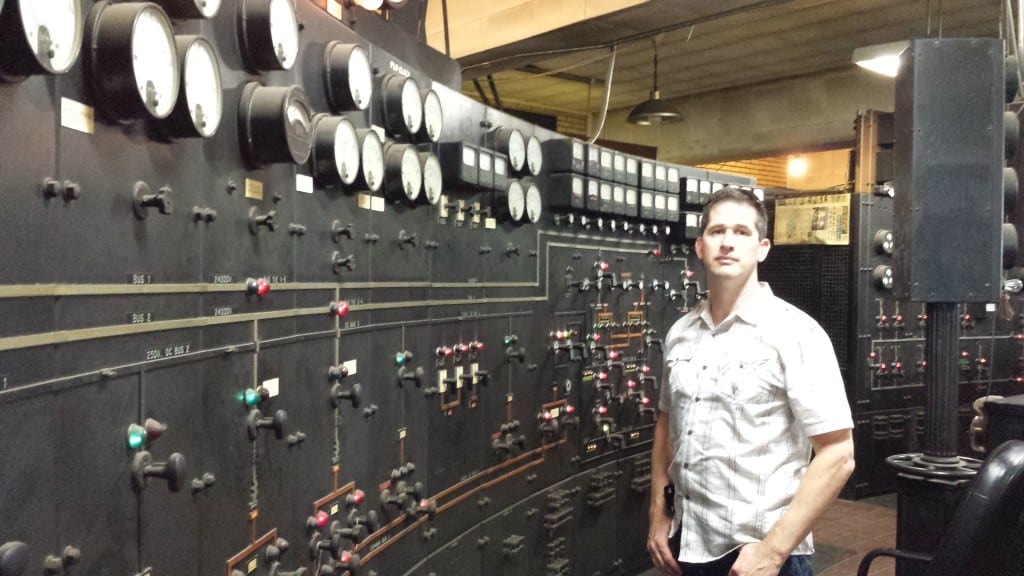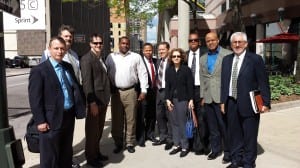 Seattle City Light is sharing its expertise in energy efficient street lighting as part of a White House advisory team that is working to help the city of Detroit replace its crumbling streetlight and electrical infrastructure, enhance disaster recovery, reduce theft and vandalism, promote urban renewal and negotiate tariffs related to electrical services.
Seattle City Light is sharing its expertise in energy efficient street lighting as part of a White House advisory team that is working to help the city of Detroit replace its crumbling streetlight and electrical infrastructure, enhance disaster recovery, reduce theft and vandalism, promote urban renewal and negotiate tariffs related to electrical services. 
City Light Energy Delivery Engineering Manager John Nierenberg inspects 70-year-old electrical equipment still in use by Detroit.
Seattle City Light is sharing its expertise in energy efficient street lighting as part of a White House advisory team that is working to help the city of Detroit replace its crumbling streetlight and electrical infrastructure, enhance disaster recovery, reduce theft and vandalism, promote urban renewal and negotiate tariffs related to electrical services.
Conservation Resources Manager Edward Smalley, who served as director of the US Department of Energy’s Municipal Solid-State Street Lighting Consortium for four years, organized the team with experts from around the country on behalf of the Department of Energy. Joining Smalley on the team from City Light were Energy Delivery Engineering Manager John Nierenberg and Construction Management Services Manager Mike Nordin.

The Detroit Public Lighting Advisory Group. City Light’s Edward Smalley is at center-left. Mike Nordin and John Nierenberg are second and third from the left.
“In addition to street lighting experts, I’ve assembled experts from Seattle, Los Angeles, New York, Cleveland and New Orleans who can provide guidance on electrical infrastructure, construction management and prioritizing community expectations under urgent conditions,” Smalley said. “This project will be a tremendous boost to the average citizen of the City of Detroit. That’s why all of us on the advisory group and our home towns are all pulling for success of the program – because this community deserves more.”
Secretary of Energy Ernest Moniz joined the team, known as the Detroit Public Lighting Advisory Group, for a visit to Detroit on May 22 to review that city’s needs and start to put together recommendations. The advisory group expects to present its recommendations to the city of Detroit later this month.
About 40 percent of Detroit’s 88,000 streetlights do not work and the city has experienced similar problems maintaining the energy delivery infrastructure it operates to provide power to over 1,000 government and non-profit buildings. The decline built up over decades of neglect amid an exodus by hundreds of thousands of residents, surging numbers of abandoned homes and a failing economy that cut revenues for operation of the now-bankrupt city’s infrastructure and services.
“The Detroit Public Lighting Department’s distribution system is predominately at end of life due to huge under investment over the last three decades,” Nierenberg said. “Critical loads like hospitals and fire stations need to be moved from this failing system as soon as possible.”
“Department management needs to reestablish a culture of safety first,” he said. “The employees work heroically to keep the failing system together, but there are insufficient resources. The city needs to be viewed like it suffered a major catastrophe similar to a major storm. It will take decades to stabilize, make safe and decommission the public lighting system.”
In December 2013, the Department of Energy asked Smalley to organize an advisory group to assist Detroit in addressing those problems.
Before the advisory group was created, Detroit leaders were considering a plan to replace all the city’s streetlights with older high-pressure sodium lighting technology. At an initial meeting with Detroit officials, Smalley and Pacific Northwest National Laboratory’s Bruce Kinzey, explained how energy efficient LED streetlights would provide better service and lower operating costs from day one. Detroit’s Public Lighting Authority now plans to invest $160 million to overhaul its street lighting system with LEDs over the next two years.
That work is being supported by a White House initiative called the High Performance Outdoor Lighting Accelerator, which is aimed at replacing more than 500,000 streetlights and making system-wide upgrades to municipal lighting in Detroit; Kansas City; West Palm Beach, Fla.; Little Rock, Ark., and Huntington Beach, Calif.
Detroit also is grappling with decommissioning the 80-year-old Mistersky natural gas-fired power plant it closed in 2010 along with 34 electrical substations and what to do with power lines that in many cases run adjacent to those of the private utility, DTE Energy, that serves the majority of the city.
